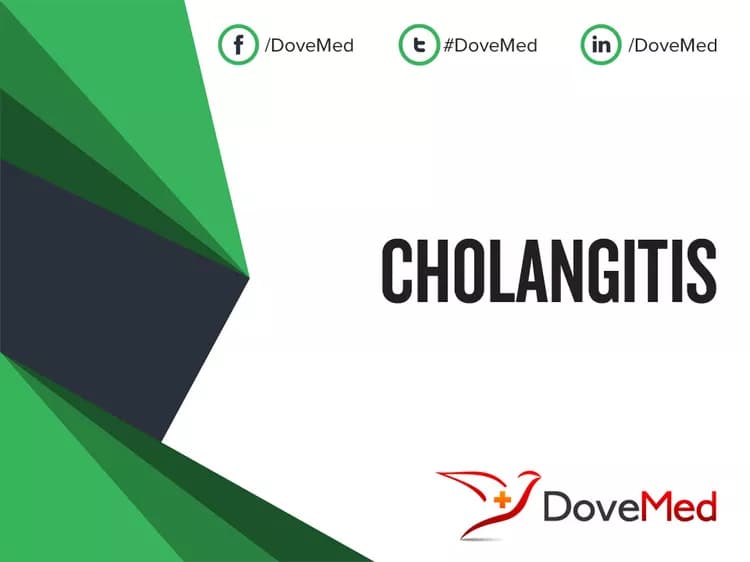What are the other Names for this Condition? (Also known as/Synonyms)
- Ascending Cholangitis
- Biliary Tract Infection
- Infection of the Biliary Tract
What is Cholangitis? (Definition/Background Information)
- Cholangitis is infection of the biliary tract (or bile duct) caused by bacteria. The biliary tract is a tube that drains the bile juice from the liver into the intestine
- Organisms commonly responsible for Cholangitis include Bacteroides fragilis, Escherichia coli, Enterococci and Klebsiella. This infection is reported to occur chiefly in older adults
- The two important risk factors for Cholangitis include any obstruction in the biliary tract, such as due to bile duct stone or tumor, or procedures to manipulate the bile duct such as endoscopic retrograde cholangio-pancreatography (ERCP)
- Some common symptoms associated with Cholangitis include fever, jaundice, and abdominal pain. The diagnosis may be established through a complete physical examination, blood tests, and an abdominal ultrasound scan
- Broad spectrum antibiotics to treat biliary tract infection are the mainstay of treatment. In severe cases of Cholangitis, endoscopic decompression may be required to drain the pus from the biliary tract
- The prognosis of Cholangitis depends upon the provision of timely treatment. Whereas less severe cases with appropriate treatment have very good prognosis, severe cases with delayed treatment may result in grave complications such as sepsis or kidney failure
- Addressing issues of biliary tract obstruction in a timely manner may help an individual from developing Cholangitis
Who gets Cholangitis? (Age and Sex Distribution)
- Cholangitis mostly occurs in older adults; the median age of this condition is between 50-60 years
- There is no specific gender predilection reported, both males and females are affected
- One variant called Asian Cholangitis or Recurrent Pyogenic Cholangitis is commonly seen in South East Asia
What are the Risk Factors for Cholangitis? (Predisposing Factors)
The risk factors reported to be associated with Cholangitis include:
- Any condition that may cause biliary tract obstruction such as:
- Biliary duct stones
- Strictures
- Tumors
- Choledochal or biliary cyst
- Sump syndrome: It is a complication of a surgery called biliary-enteric anastomosis (BEA). In this procedure, the bile duct is connected to the intestine through a surgery. Cholangitis may occur in 1% of the individuals who have undergone the surgical procedure. In bile sump syndrome, stone and other food particles accumulate in the bile duct resulting in recurrent Cholangitis and biliary obstruction
- Biliary parasites in underdeveloped countries such as due to schistosomiasis
- HIV infection
- Manipulation of the biliary tract using procedures such as endoscopic retrograde cholangio-pancreatography
It is important to note that having a risk factor does not mean that one will get the condition. A risk factor increases ones chances of getting a condition compared to an individual without the risk factors. Some risk factors are more important than others.
Also, not having a risk factor does not mean that an individual will not get the condition. It is always important to discuss the effect of risk factors with your healthcare provider.
What are the Causes of Cholangitis? (Etiology)
Cholangitis is caused by bacterial infection of the biliary tract (generally known as the common bile duct). The bacteria commonly responsible for Cholangitis include the following:
- Bacteroides fragilis
- Enterococci
- Escherichia coli
- Klebsiella
What are the Signs and Symptoms of Cholangitis?
The common signs and symptoms associated with Cholangitis include:
- Fever
- Jaundice
- Right upper abdominal pain
- Nausea and vomiting
The first 3 symptoms are collectively called Charcot’s triad. If these signs are present after a known biliary stone or any biliary tract procedure, then it is considered highly suggestive of Cholangitis.
How is Cholangitis Diagnosed?
The diagnosis of Cholangitis may involve the following procedures and tests:
- Complete evaluation of medical history along with thorough physical examination
- An assessment of symptoms; a patient might exhibit typical symptoms of the disease, known as the Charcot’s triad
- Complete blood count (CBC), which would probably show elevated total WBC count
- Liver function count may show elevated bilirubin and alkaline phosphatise levels
- Blood culture and bile culture may likely identify the specific organism causing the infection
- Abdominal ultrasound scan may reveal dilated bile duct or the presence of biliary stones or tumor
Many clinical conditions may have similar signs and symptoms. Your healthcare provider may perform additional tests to rule out other clinical conditions to arrive at a definitive diagnosis.
What are the possible Complications of Cholangitis?
Some possible complications associated with Cholangitis may include:
- Sepsis
- Acute renal failure
How is Cholangitis Treated?
The treatment options for Cholangitis may include the following:
- Administration of broad spectrum antibiotics; common antibiotics administered include
- Piperacillin and Ceftazidime for Gram-negative coverage
- Ampicillin for Gram-positive coverage
- Metronidazole for anaerobic coverage
- Taking measures to correct fluid and electrolyte imbalance
- In case of severe Cholangitis caused by an obstruction, the obstruction has to be decompressed using endoscopy or percutaneous drainage procedures. These procedures have largely replaced the use of surgical/invasive procedures
How can Cholangitis be Prevented?
Appropriate treatment of predisposing factors, such as stones, tumor, or parasitic infestation of the biliary tract, may help prevent the occurrence of Cholangitis.
What is the Prognosis of Cholangitis? (Outcomes/Resolutions)
- Cholangitis usually improves after antibiotic treatment or decompression of the biliary tract
- The prognosis is worse in individuals who are:
- Old
- Female gender
- Have acute renal failure
- Pre-existing cirrhosis
- Biliary obstruction due to cancer
Additional and Relevant Useful Information for Cholangitis:
Primary sclerosing cholangitis (PSC) is considered to be an autoimmune disease that is characterized by inflammation of the biliary duct, which ultimately results in scarring.
The following link may help you understand primary sclerosing cholangitis:
http://www.dovemed.com/diseases-conditions/primary-sclerosing-cholangitis/
Related Articles
Test Your Knowledge
Asked by users
Related Centers
Related Specialties
Related Physicians
Related Procedures
Related Resources
Join DoveHubs
and connect with fellow professionals


0 Comments
Please log in to post a comment.